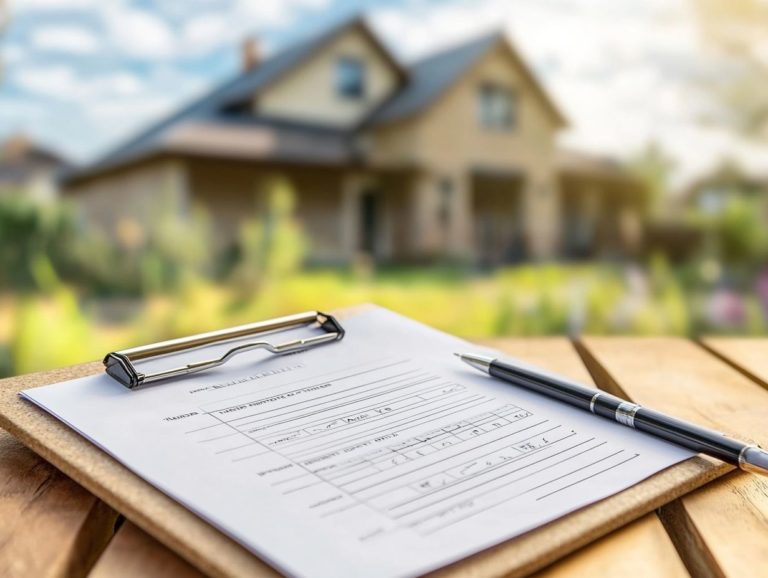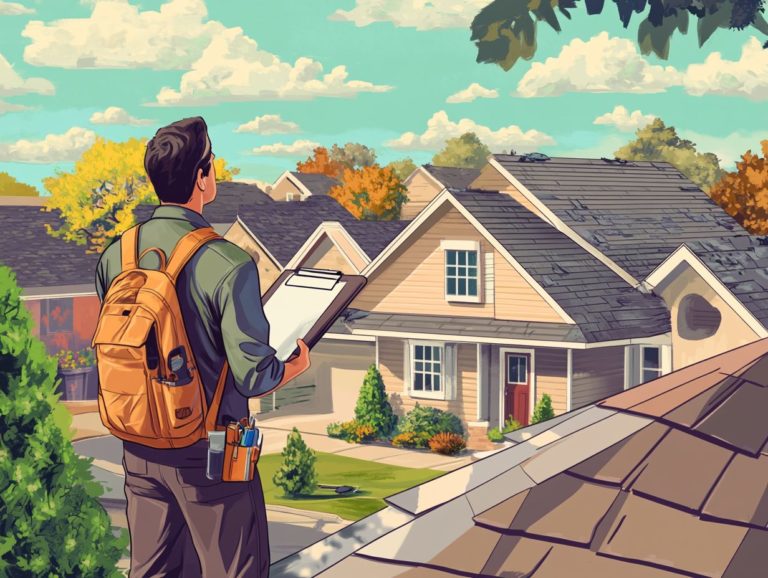The Role of Home Inspections in Buyer Confidence
Buying a home is one of the most significant investments you will ever make. It s essential to ensure you make a sound decision!
This is where home inspections come into play. In this article, you’ll explore the purpose of home inspections and their crucial role in enhancing buyer confidence.
You ll discover the benefits, potential drawbacks, what to anticipate during an inspection, common red flags to watch for, and how to effectively utilize the inspection report.
Additionally, you ll receive guidance on selecting a reliable home inspector. Equip yourself with the knowledge that can safeguard your investment!
Contents
- Key Takeaways:
- What is a Home Inspection?
- Why Home Inspections are Important for Buyers
- Summary
- What to Expect During a Home Inspection
- Common Issues Found During Home Inspections
- How to Use a Home Inspection Report
- Choosing a Reliable Home Inspector
- Frequently Asked Questions
- What is the role of home inspections in buyer confidence?
- Why are home inspections important for buyers?
- Can home inspections affect the buyer’s decision to purchase a property?
- Are home inspections required for all property purchases?
- Who is responsible for scheduling and paying for a home inspection?
- Can a buyer waive the right to a home inspection?
Key Takeaways:
- A home inspection is a crucial step in the home buying process, providing valuable information about the property s condition and potential hazards.
- Home inspections build buyer confidence by identifying major issues or risks, enabling informed decision-making and negotiation with the seller.
- Carefully reviewing and understanding the home inspection report is vital. Address any concerns and negotiate with the seller for necessary repairs or adjustments.

What is a Home Inspection?
A home inspection is an essential step in real estate transactions. It evaluates the property’s condition, highlights potential safety issues, and confirms compliance with building codes.
This thorough assessment is typically conducted by licensed professionals, who provide a detailed report on various systems, including electrical, plumbing, and structural elements like the foundation and roof.
By opting for a home inspection, you empower yourself in the negotiation process, fostering transparency and trust. Understanding the role of home inspections in real estate transactions ultimately protects your investment and boosts the property’s market appeal.
Definition and Purpose
A home inspection involves assessing a property’s condition, focusing on the strength of the building’s structure and potential safety concerns.
It s not just about uncovering flaws; a comprehensive inspection is an invaluable negotiation tool. By identifying problems, you can make informed decisions regarding your offers and any necessary repairs, paving the way for constructive dialogue with the seller.
Understanding the property s overall condition can dramatically shape your strategy. You may request concessions or even walk away if the issues are too daunting.
In this sense, home inspections do more than protect your investment; they help create smoother real estate transactions by highlighting the role of home inspections in new construction, ensuring everyone’s expectations are aligned.
Why Home Inspections are Important for Buyers
Home inspections are essential for buyers, providing substantial benefits that help mitigate risks when purchasing a new property. Understanding the role of home inspections in real estate is crucial for making informed decisions.
They increase your awareness of maintenance issues and protect your investment over time. A comprehensive inspection gives you clarity on the property’s condition, enabling well-informed decisions.
This process can uncover hidden issues that, if overlooked, could lead to costly repairs down the line.
With an inspection report, you gain valuable insights that allow you to negotiate necessary repairs or price adjustments before finalizing the deal.
Benefits and Potential Drawbacks
The benefits of home inspections are significant. They uncover potential issues that could impact the property’s value and safety. For sellers, understanding the role of home inspections in buyer-seller negotiations fosters transparency and trust with prospective buyers.
Inspections serve as invaluable tools in real estate. They empower you to negotiate repairs or price adjustments based on documented findings. A thorough report can reveal hidden problems, like structural defects or outdated systems, providing leverage for more favorable deals. For more insights, consider understanding the role of home inspectors.
If you re selling, investing in a pre-listing inspection allows you to address issues upfront. This enhances your property s marketability and can justify a higher asking price. Ultimately, the insights gained from these inspections enable informed decisions, influencing the transaction dynamics and ensuring a smoother process overall.
Don t wait! Schedule your home inspection today to protect your investment!
Summary
In summary, home inspections are crucial for safeguarding your investment. They provide essential insights into the property’s condition, enhance buyer confidence, and serve as powerful negotiation tools. Understanding the role of home inspections in the home buying process can lead to a smoother and more informed real estate transaction, whether you’re buying or selling.
For more information on home inspections or to find reliable inspectors, consider checking out additional resources online!
What to Expect During a Home Inspection

During a home inspection, you can anticipate a comprehensive process that usually unfolds over several hours. This timeframe allows inspection experts to carefully check the property using a standardized checklist that addresses essential components, including structural integrity, plumbing systems, and electrical systems.
The duration varies based on the property’s size and condition. It’s vital for you to be present. This presence ensures you grasp the inspection findings directly and have the opportunity to inquire about any aspects of the evaluation process that pique your interest.
Process and Timeline
The home inspection process is a carefully structured journey where skilled inspection experts meticulously examine various aspects of your property. This ultimately produces a detailed inspection report that highlights their findings.
The process starts with a detailed evaluation, where these professionals assess both the interior and exterior elements of your home. This includes the roof, foundation, plumbing, electrical systems, and HVAC units.
This in-depth examination typically takes three to four hours, depending on the size and complexity of the property.
During this period, inspectors use advanced tools and techniques. This ensures that not a single detail goes unnoticed.
Once the inspection is complete, the results are compiled into a comprehensive report that outlines any issues, possible safety issues, and recommendations for repairs or further evaluations. You and your agent can leverage this document to make informed decisions and negotiate effectively, providing you with the confidence you need as you move forward.
Common Issues Found During Home Inspections
Home inspections frequently uncover a range of common issues related to the property. These can range from concerns about structural integrity to hidden problems that could present safety hazards.
As a buyer, knowing these common issues can help you avoid surprises. Embracing a proactive approach to problem-solving enables you to tackle any concerns before they evolve into expensive repairs, ultimately safeguarding your investment and ensuring the property remains a solid choice for the future.
Identifying Red Flags
Identifying red flags during a home inspection is essential. These warning signs often point to serious underlying safety issues or concerns about the property’s condition.
As a prospective homebuyer, being vigilant during this process can save you considerable money in the long run.
For example, mold growth often lurking in hard-to-reach areas can indicate hidden water damage, leading to potentially hefty remediation costs.
Similarly, cracked foundations not only compromise structural integrity but can also drive up your insurance premiums. Stay alert for outdated electrical systems, as they pose safety hazards and may require significant upgrades.
Each of these factors plays a crucial role in a property’s overall value and can even affect its resale potential. This highlights the importance of thorough inspections to protect your investment.
How to Use a Home Inspection Report
A home inspection report becomes an essential negotiation asset. It enables you to tackle concerns and devise strategic repair plans grounded in professional evaluations and recommendations.
This document gives both buyers and sellers the power to navigate discussions with clarity and confidence.
Negotiating and Addressing Concerns

In the negotiation process, the home inspection report becomes your best ally, addressing the concerns that surface during evaluation. It gives you the power to present the findings to the sellers and negotiate potential repairs or price reductions.
This detailed document often uncovers critical issues, such as the need for a new roof, outdated plumbing, or electrical problems all factors that can significantly influence the property’s value.
When approaching sellers, arm yourself with factual information, emphasizing the urgency and implications of the identified concerns. For example, suggesting reasonable concessions like a credit toward closing costs or specific repairs completed before the sale can pave the way for a win-win scenario.
It s crucial to maintain empathy throughout the process. Acknowledge the seller’s perspective while clearly articulating the necessity for adjustments that will ensure the long-term safety and functionality of the home.
Don t miss out! Schedule your home inspection today to empower your home-buying journey!
Choosing a Reliable Home Inspector
Choosing a reliable home inspector is crucial for a thorough evaluation of your property. Consider the inspector’s experience, credentials, and reputation.
Ask questions about their inspection methods, adherence to building codes, and familiarity with local conditions. This will influence the inspection quality and the insights you’ll gain from the report.
Factors to Consider and Questions to Ask
Focus on key factors like experience and costs when selecting a home inspector. It’s also important to ask specific questions to assess their suitability.
Inquire about their qualifications, such as certifications from reputable organizations like the International Association of Home Inspectors. Their experience with different types of properties, especially older homes, can reveal their expertise.
Discuss the inspection’s scope and whether they offer additional services like thermal imaging (a method that detects heat variations in the home) or radon testing.
Understand their reporting style, turnaround time, and request references from previous clients. This will affirm their credibility and thoroughness.
Frequently Asked Questions
What is the role of home inspections in buyer confidence?
Home inspections build buyer confidence by thoroughly evaluating the property’s condition. Understanding the role of home inspections in home sales helps buyers make informed decisions about their purchase.
Why are home inspections important for buyers?

Home inspections are vital because they provide a detailed report on the property’s condition. This allows buyers to spot potential issues and understand the importance of home inspections to negotiate repairs or price changes.
Can home inspections affect the buyer’s decision to purchase a property?
Yes, inspections can significantly impact a buyer’s decision. If major problems or safety hazards are found, buyers may reconsider their purchase or ask for repairs. Understanding the value of home inspections for home sellers can help sellers navigate this process effectively.
Are home inspections required for all property purchases?
No, inspections are not mandatory for every property purchase. However, it is highly recommended to carry out a home inspection to avoid future surprises and costly repairs.
Who is responsible for scheduling and paying for a home inspection?
The buyer usually handles scheduling and payment for the inspection. However, sellers can choose to pay to showcase the property s condition and boost buyer confidence.
Can a buyer waive the right to a home inspection?
Yes, buyers can waive their right to an inspection, but this is risky. It’s always best to have a professional evaluation to ensure a sound investment.






